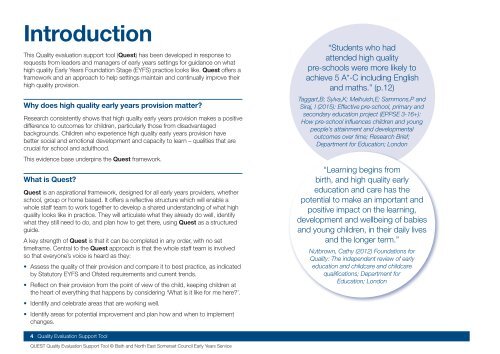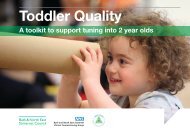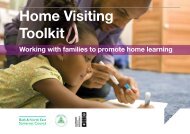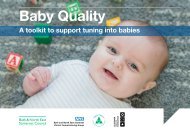Quest Taster Pages
Create successful ePaper yourself
Turn your PDF publications into a flip-book with our unique Google optimized e-Paper software.
Introduction<br />
This Quality evaluation support tool (<strong>Quest</strong>) has been developed in response to<br />
requests from leaders and managers of early years settings for guidance on what<br />
high quality Early Years Foundation Stage (EYFS) practice looks like. <strong>Quest</strong> offers a<br />
framework and an approach to help settings maintain and continually improve their<br />
high quality provision.<br />
Why does high quality early years provision matter?<br />
Research consistently shows that high quality early years provision makes a positive<br />
difference to outcomes for children, particularly those from disadvantaged<br />
backgrounds. Children who experience high quality early years provision have<br />
better social and emotional development and capacity to learn – qualities that are<br />
crucial for school and adulthood.<br />
This evidence base underpins the <strong>Quest</strong> framework.<br />
What is <strong>Quest</strong>?<br />
<strong>Quest</strong> is an aspirational framework, designed for all early years providers, whether<br />
school, group or home based. It offers a refl ective structure which will enable a<br />
whole staff team to work together to develop a shared understanding of what high<br />
quality looks like in practice. They will articulate what they already do well, identify<br />
what they still need to do, and plan how to get there, using <strong>Quest</strong> as a structured<br />
guide.<br />
A key strength of <strong>Quest</strong> is that it can be completed in any order, with no set<br />
timeframe. Central to the <strong>Quest</strong> approach is that the whole staff team is involved<br />
so that everyone’s voice is heard as they:<br />
• Assess the quality of their provision and compare it to best practice, as indicated<br />
by Statutory EYFS and Ofsted requirements and current trends.<br />
• Refl ect on their provision from the point of view of the child, keeping children at<br />
the heart of everything that happens by considering ‘What is it like for me here?’.<br />
• Identify and celebrate areas that are working well.<br />
• Identify areas for potential improvement and plan how and when to implement<br />
changes.<br />
“Students who had<br />
attended high quality<br />
pre-schools were more likely to<br />
achieve 5 A*-C including English<br />
and maths.” (p.12)<br />
Taggart,B; Sylva,K; Melhuish,E; Sammons,P and<br />
Siraj, I (2015): Effective pre-school, primary and<br />
secondary education project (EPPSE 3-16+):<br />
How pre-school infl uences children and young<br />
people’s attainment and developmental<br />
outcomes over time; Research Brief;<br />
Department for Education; London<br />
“Learning begins from<br />
birth, and high quality early<br />
education and care has the<br />
potential to make an important and<br />
positive impact on the learning,<br />
development and wellbeing of babies<br />
and young children, in their daily lives<br />
and the longer term.”<br />
Nutbrown, Cathy (2012) Foundations for<br />
Quality: The independent review of early<br />
education and childcare and childcare<br />
qualifi cations; Department for<br />
Education; London<br />
4 Quality Evaluation Support Tool<br />
QUEST Quality Evaluation Support Tool © Bath and North East Somerset Council Early Years Service<br />
<strong>Quest</strong> toolkit A4 aw.indd 4 21/03/2018 14:26





